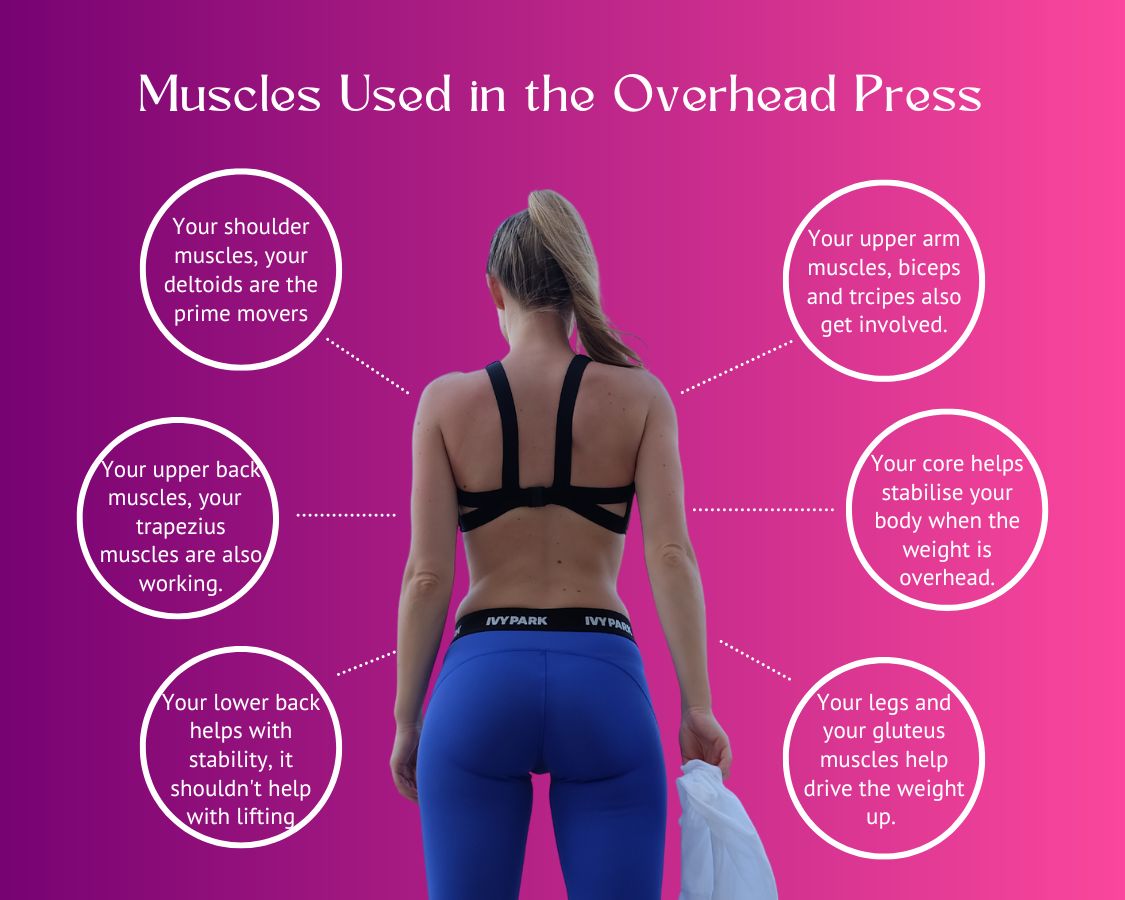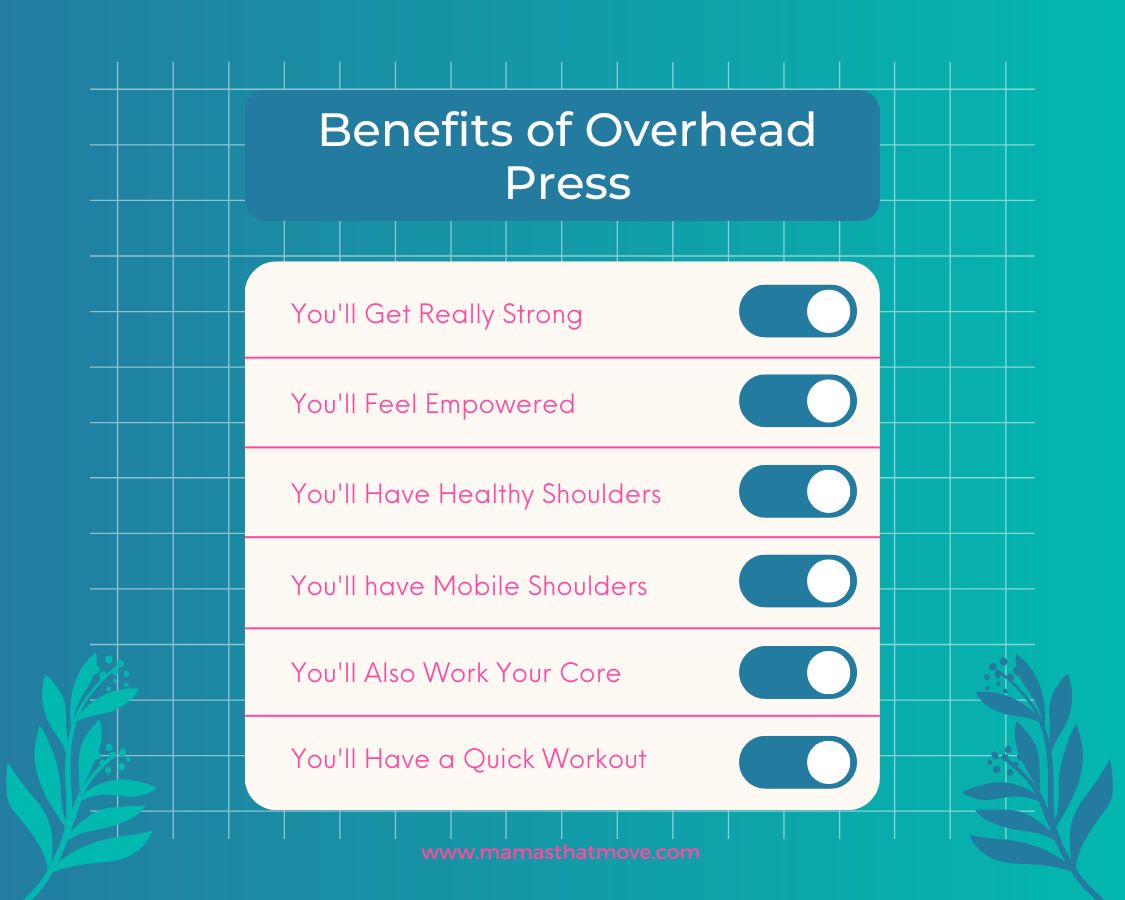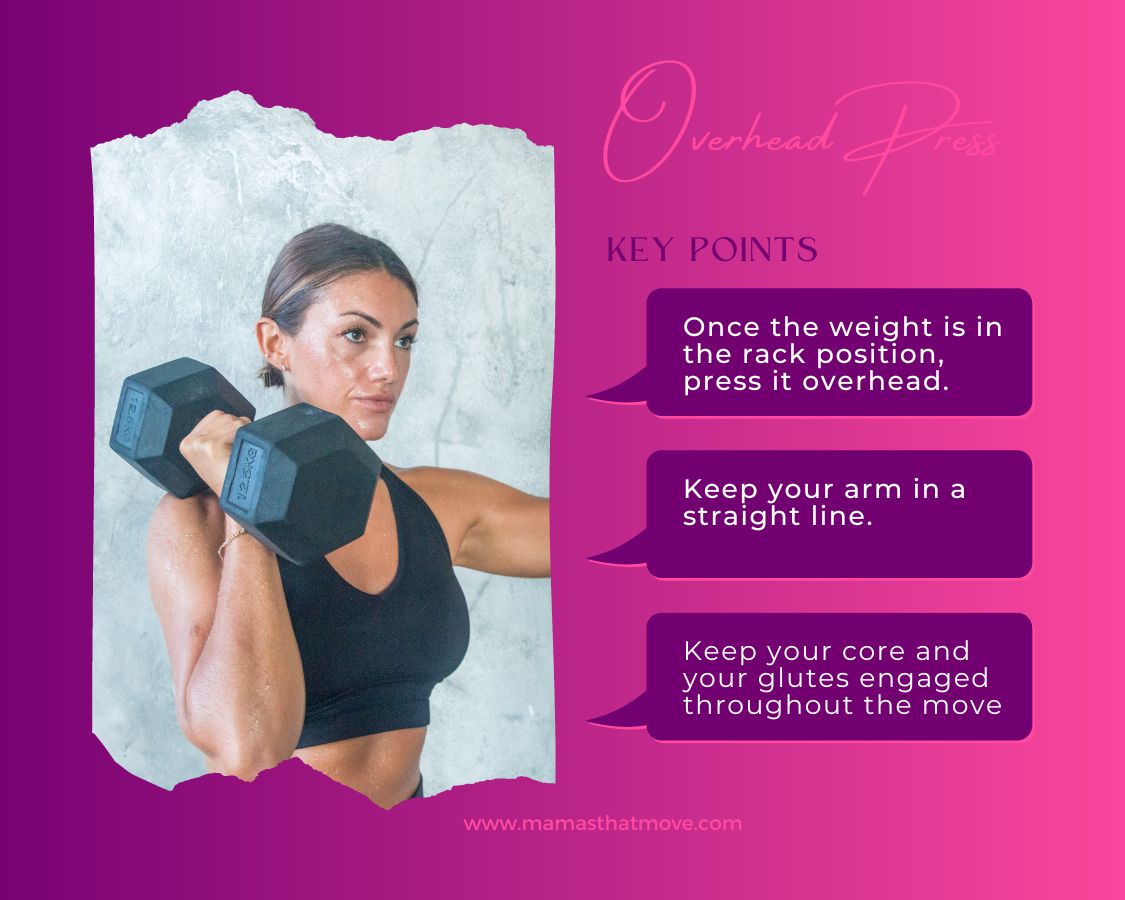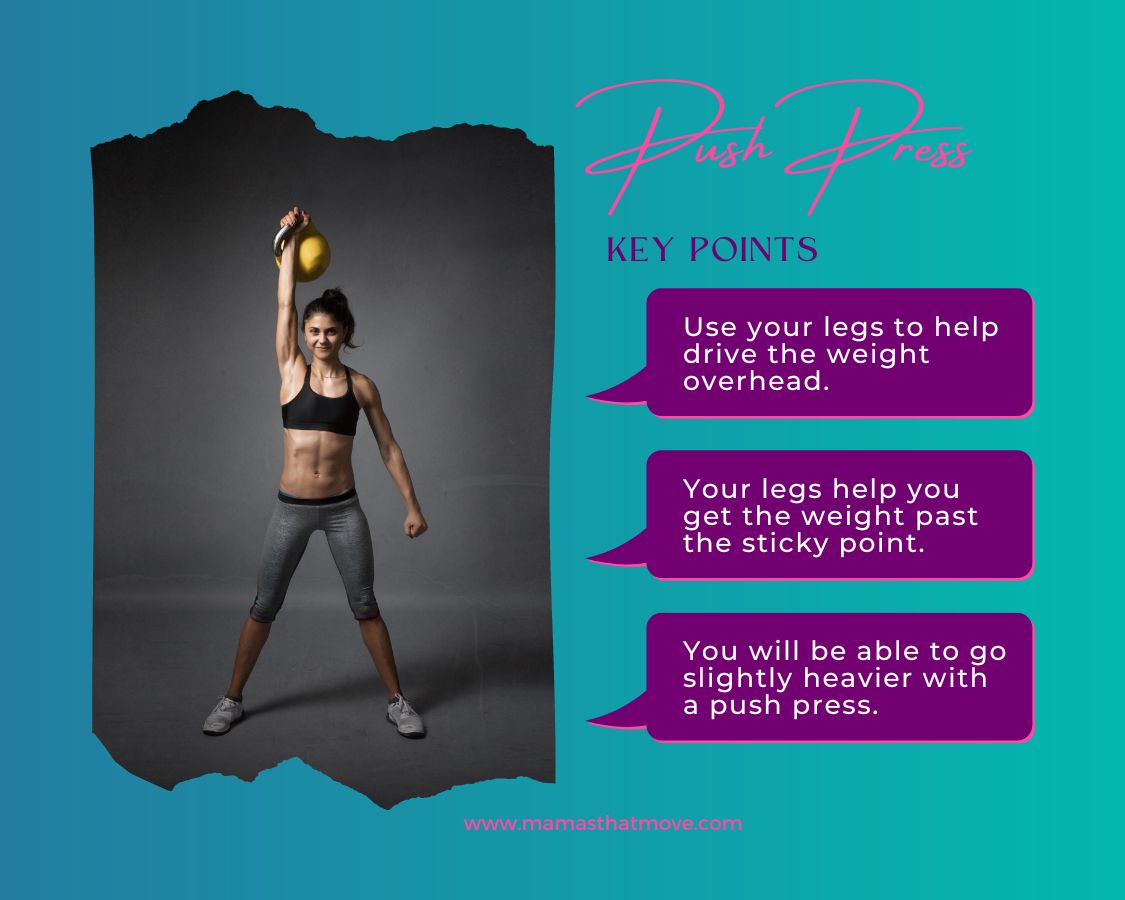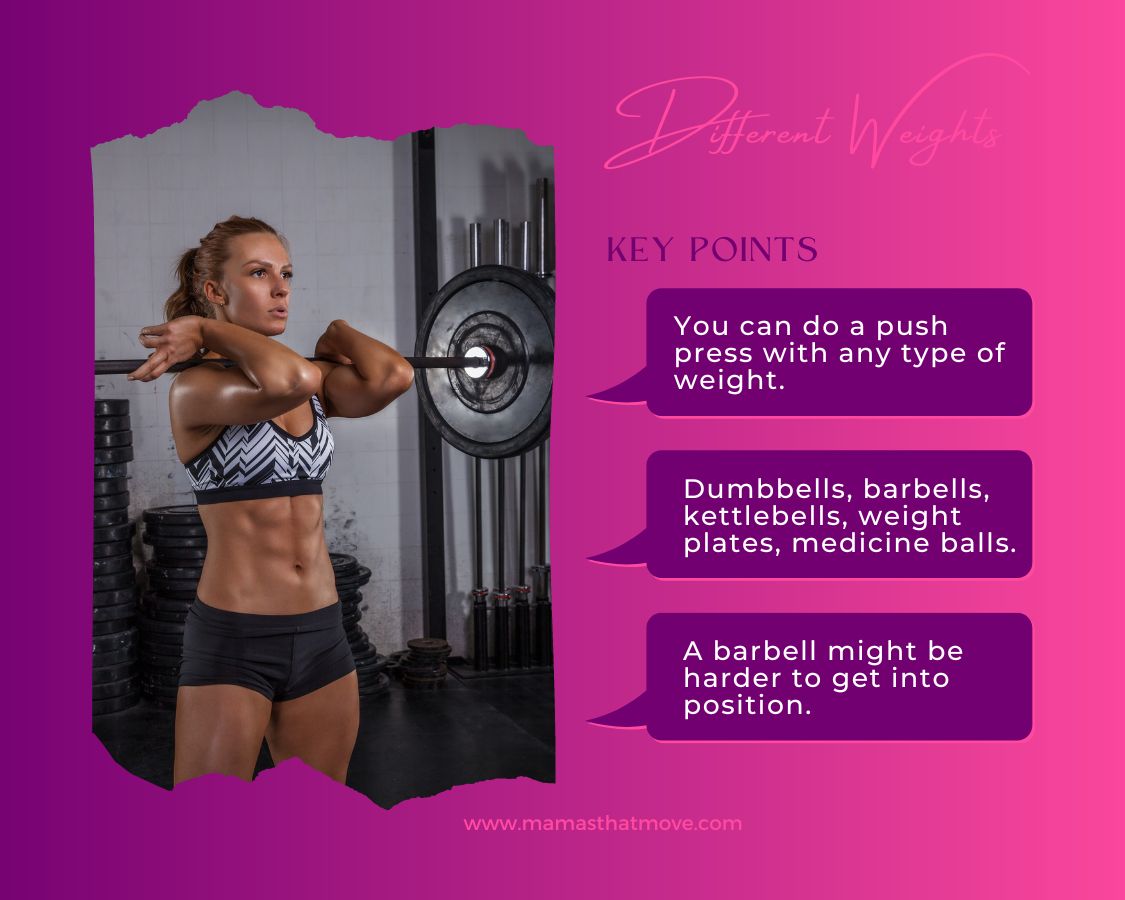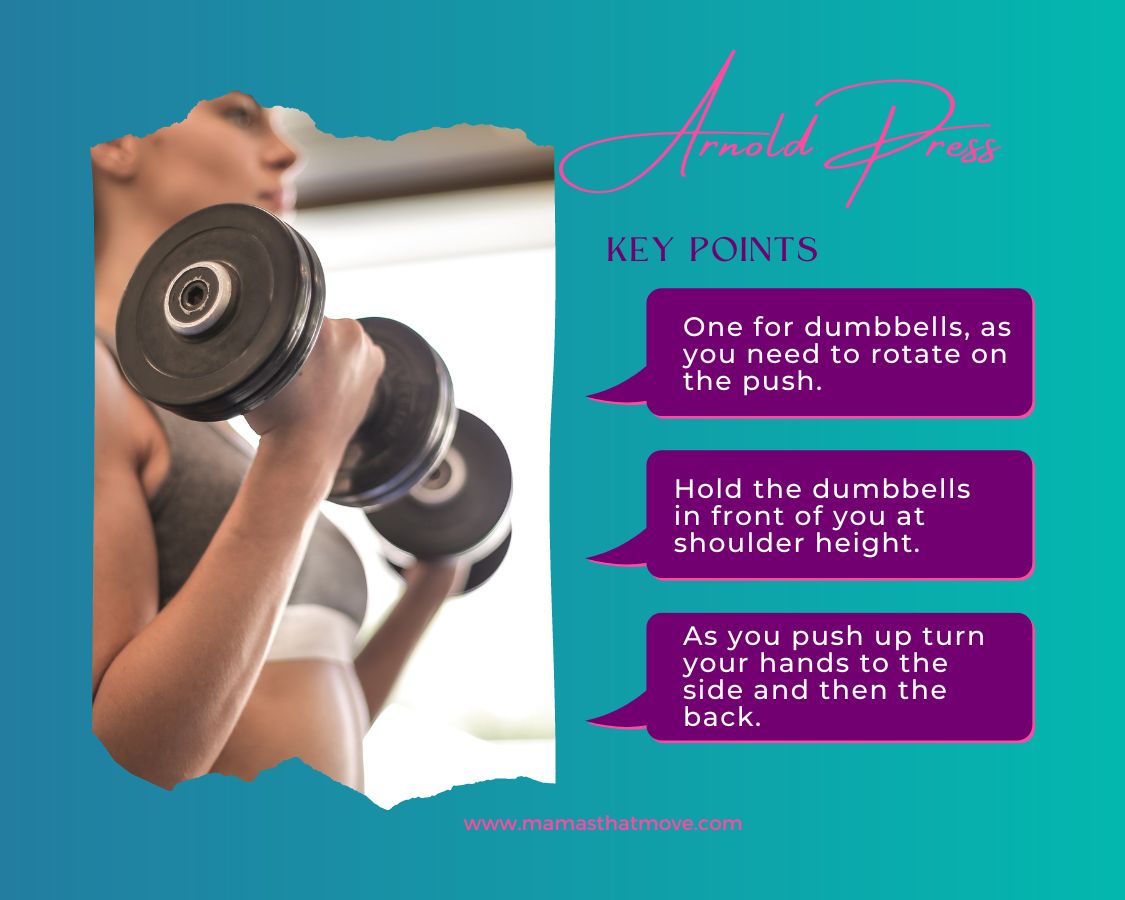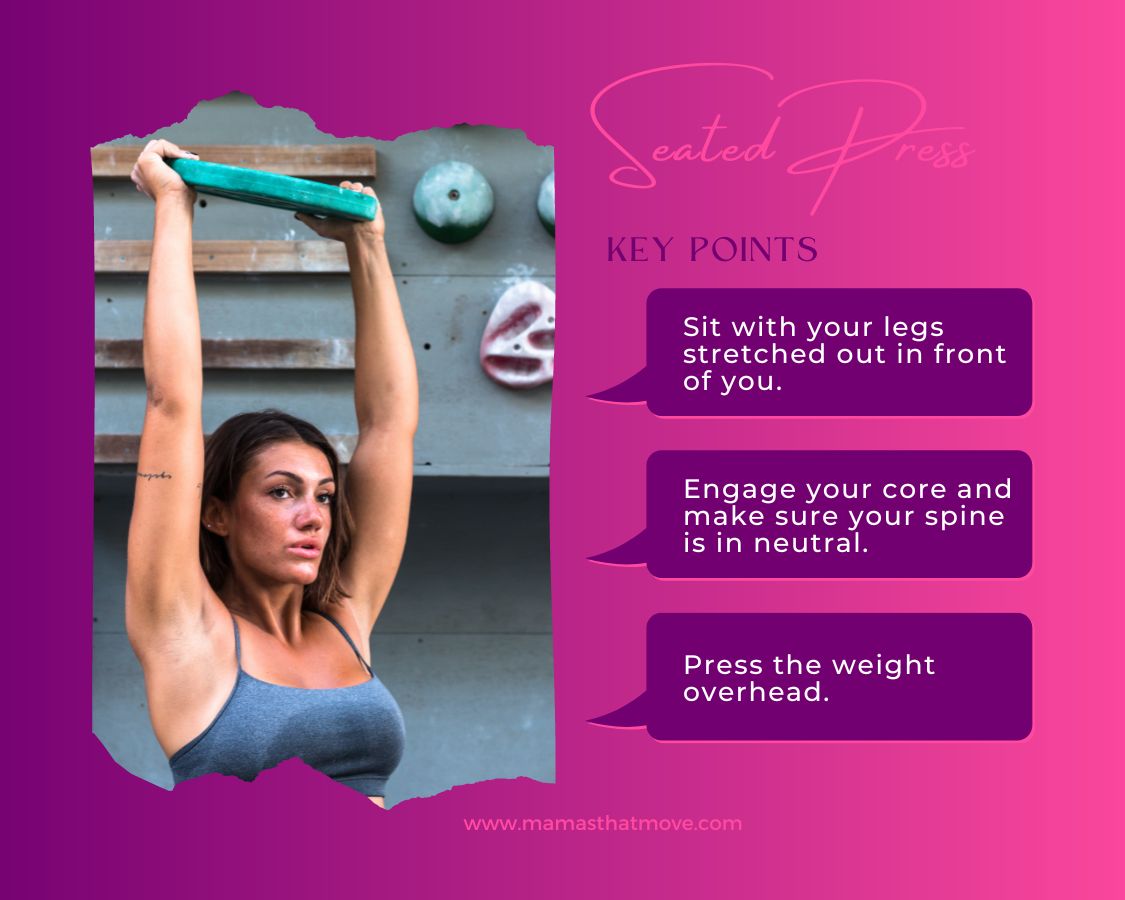- Home
- Strength Training for Women
- Benefits of Overhead Press
Benefits of Overhead Press: It’s Not Just for Bigger Shoulders
What are the benefits of overhead press? Why should you do them, even if you don't want bigger shoulders...
Beth's 1 Week Meal Plan

As you know I am a keen advocate of strength training for women.
I think we should
all be doing it.
I think we should
all be stronger than men. Because we are.
The overhead press
is one of the best exercises and I have to say, it’s one of my
favourites.
But there’s more
to it than increasing your upper body strength, or getting bigger
shoulders. It’s an excellent exercise for everyone to do.
And, yes, that
includes you mama.
Shall we look at why
you should include the overhead press into your workout routine?
Let’s do it…
1. Benefits of overhead Press: Healthy Shoulders
Does that sound a
bit silly?
I mean shoulder
health, really?
But the crux of it
is, your shoulder is a joint and you have to look after your joints
so they stay mobile and limber right through your life.
As someone who has
suffered a shoulder injury, I tore my rotator cuff, I can attest to
how much we use our shoulders throughout the day.
Getting anything
from a wall cupboard in the kitchen, or a shelf in the supermarket.
Catching your kids as they jump off the slide. Or just picking them
up. Washing your hair. Brushing your teeth.
Actually anything
you use your arms for, your shoulder joint is involved.
And the more
shoulder strength you have, the more they will be able to carry the
weight of your family long into your senior years.
But, as I said
earlier, the overhead press isn’t just about getting stronger
shoulders, it’s about shoulder mobility and shoulder stability.
Hey, I’m a poet.
But seriously, as
you work on the overhead press, your range of motion will be
increasing. And the ability to keep your shoulder stable even when
you have a weight overhead.
Think getting your
kid down from a high tree. Or something heavy off the top of the
wardrobe.
No, the overhead press isn’t just for those wanting bigger should muscles, it’s for everyone who wants to use their shoulders, and their arms, late into life.
2. Benefits of Overhead Press: It’s a Compound Exercise
You know me, I’m
all about efficiency when it comes to working out. And single
exercises that work more than one body part...they’re my jam.
The overhead press
is one such exercise.
You might think it’s
just an upper body exercise, but you’d be mistaken.
You see, when you’ve
got weight overhead you’re also using your abdominal muscles, your
gluteus muscles, even your lower body muscles, they’re are all be
recruited to help stabilise your body and hold that weight in place.
Just a side note
here, the muscles recruited in stabilising your body is more
prominent when you’re pressing with one arm. So a dumbbell press,
or kettlebell press, rather than a barbell press.
That’s because,
one top of the fact you’re trying to hold it overhead, you’re
also off balance.
The prime movers, or
the muscles primarily involved in getting that weight overhead and
holding it there, are undoubtedly your upper body muscles, your
deltoids, your upper arms, your upper back muscles/ But your core
muscles, lower back muscles, your lower body muscles. They all play a
massive part in you being able to press overhead.
That surely makes it an efficient way to workout.
3. Benefits of Overhead Press: You’ll get Uber Strong
One of the main
benefits of strength training is that you get, well, stronger.
And the overhead
press has got to be the strengthyist exercise of them all.
Squats and deadlifts
are all, safe moves.
You have the
barbell, dumbbell or kettlebell in a safe position and resting on
your entire body. But when you throw a heavy weigh overhead, and you
nail it. There is just something more satisfying, more empowering
about that than the other lifts.
You think, yeah man,
I’ve f*****g got this.
And that spills over
into your everyday life.
Yes, you’re
stronger, you don’t need to call for your husband to open a jar, or
lift something heavy out of the cupboard, but generally, you feel
more capable. More empowered.
As I said, this has
to be my favourite of all of the exercises.
When I’m starting
to feel like life, outside forces are starting to take control,
starting to get the better of me. I go and pick up my 20 kilo
kettlebell, and I throw it up. And I feel stronger. I know I’m
stronger. I know I’ve got this.
Whatever it is. I’ve
got it.
Yeah, the overhead press, is not just for the muscle bound, meat heads at the gym. It’s for you. It’s for getting your grrrr back.
Benefits of Overhead Press: Address Your Imbalances
Before we get on to
the how to’s of the overhead press and it’s many variations, I
want you to make sure you’re in a fit state to do them.
And by that I mean,
you have the mobility to do them.
One of the biggest
mistakes I see people make, they go straight for weight. Add weight
into an exercise, when really they should be working on their form
and addressing any imbalances they may have.
So, do me a favour,
stand up, with your feet hip-width apart.
Engage your core and
lift your arms up straight over your head. Start with them down by
your side, lift them in front of you, in a semi-circluar motion,
stopping when they’re in a straight line above your head.
Can you do that?
Can you do that
without pain?
Were there any
sticky points?
If you answer yes to any of these questions, then work on mobility first. Stretches, yoga, arm circles. Do these first and then add in weight.
Benefits of Overhead Press: The Disclaimer Bit
Yes, this bit can
get boring, but it is important.
Please make sure you
are comfortable with the technique of the overhead press before you
start adding weight. If you are unsure of how to perform this
movement with good form, or you struggle with shoulder mobility (and
by that I mean you can’t raise your arms overhead without pain)
then please consult a personal trainer.
They can check out
any mobility issues you may have, make sure your body is in the
correct position, and that you generally have proper form.
If you can’t, or don’t want to, contact anyone locally, then do get in touch with me. I can assess where you are and give you practical advice to help you get where you want to be.
Benefits of Overhead Press: How to Do An Overhead Press
So, the basic goal
of an overhead press is to get the weight overhead.
That’s it. Whichever overhead press variation you choose to do, the goal is the same, get the weight overhead. How you achieve that goal, will vary.
But, the first step is to get the weight into position. And to do that you need to clean the weight up.
The Clean
Well, this bit is the interesting part…
It’s worth
learning this movement because it is a power exercise on it’s own.
I’m going to
describe this using a dumbbell. Purely because you’re more likely
to have a dumbbell than a barbell.
It is slightly
easier with a dumbbell, or a kettlebell, as they’re smaller. Not
weight wise, actual size wise.
So, with the
dumbbell on the floor, stand with your feet hip-width apart. Flex at
the hips, and knees to bend down and grasp the dumbbell or
kettlebell. As you bend down make sure your core is engaged, your
spine is in neutral and your chest is lifted.
Once you’ve grasped the dumbbell(s), push through your heels, and snap your hips through to return to standing. As you do, bring the weight up to your shoulder by sinking your elbow down. Keep your arm as close to your body as possible. This is a powerful movement, the power to get the weight up comes from the hip snap and the push through your heels.
It is a tricky move, if you’ve never done anything like this before, but once you get the hang of it, it will be like second nature.
If you’re using heavy weights you might need to use a bit of leg drive, so a kind of bounce with your legs, to get them into position. But practice the movement first with lighter weights. You can progress to heavier weights when you’ve got the technique nailed.
The Strict Press
Now you know how to get the weight into position, let's look at how you do a strict press, or a basic overhead press…
Once you've cleaned the weight up, you should be in a standing position, with the weight at shoulder height. Your elbow, or elbows should be pulled in tight to your body, your wrists should be straight, and your core engaged.
From there, you press the weight over your head, in a straight line. Your arms should be straight, your core and your glutes should be engaged.
When you’re ready to bring it down, it comes down in a straight line, back into the rack position.
Benefits of Overhead Press: A few Variations
Ok, now we know how
to do a basic, or strict overhead press, let’s look at some
variations. The more options you have, the more varied and fun your
workout will be.
Benefits of Overhead Press: The Push Press
This has got to be
one of my all time favourite movements.
Why?
Because it’s all
about brute strength and throwing a bit of weight around. I love it.
It makes me feel very powerful.
The push press uses
a leg drive to help you get the weight overhead. This means that
you’re targeting your lower body more specifically and you can lift
more weight.
A strict press is great, and should definitely form part of any upper body strength training session, but a push press definitely makes you feel more powerful.
How do you do it?
Well, it’s the same movement as the strict press. You push the weight from where it is in the rack position, up over your head.
There will be a point, if the weight is heavy enough, or you’ve completed enough strict presses, where it seems to get a bit stuck. You’re struggling to push it, that’s where you get your legs involved.
A little dip, bend with your knees, a little jump, to help you push it through that tough spot.
The leg drive helps you put your whole body weight behind the push.
Benefits of Overhead Press: Dumbbell Presses, Barbell Presses, Kettlebell Presses
If you have access
to them, you can change the type of weight you’re using for your
overhead presses.
I’ve focused on
dumbbell presses so far, purely because that’s the weights most
people have at home.
They are more
accessible than the others.
But, overhead
presses can be done with other weights as well. Barbells are another
popular option. You might find a barbell a little harder to clean
into place, but once it’s up you should find the press a little
easier as you’ve got two arms pushing the weight up rather than
just one.
You can also do
overhead presses with weight machines.
The shoulder press
is specifically designed for this type of movement. But you could
also use a smith machine, again, if you have access to it.
If you don’t have
access to any of these, don’t worry.
Dumbbells, or
kettlebells, do the job perfectly well.
If you haven’t
even got those then you could try a ruck sack with something heavy in
it. A few bags of potatoes etc.
Proper weights are better, but that is an option if you haven’t got weights.
Benefits of Overhead Press: Arnold Press
Ok, an Arnold Press
adds a bit of rotation as you press the dumbbells overhead. Yes, this
one is specifically for dumbbells. You won’t be able to get the
rotation with a barbell.
You could probably do it with a kettlebell, but the shape of the bell is going to mean the weight is hanging differently to a dumbbell. Make sure you keep the kettlebell close to your arms, or it’s going to put too much strain on your muscles.
How to Do An Arnold Press
Anyway, you start with arms in front of you. Hands, holding the dumbbells, at shoulder height, fists facing towards your shoulders.
As you press up, your hands come out to the side and then to the back of you.
So your hands rotate through 180 degrees, but your fists are facing your body at all times.
This is a bit of a complicated one to imagine, so if you’re struggling, check out this video.
This is a great one for working all of your shoulder muscles, your posterior deltoids, your anterior deltoids and your medial deltoids.
Benefits of Overhead Press: Seated Overhead Press, or Z Press
You might think a
seated overhead press is easier. You’re sat down after all, a
little rest.
You’d be mistaken.
It’s tough.
See when you’re
sitting you take away any influence your lower body can have. You
might think that you’re doing a strict press, with no involvement
from your lower body, but there will be some. Even it’s it minute.
Also, when you’re
sitting, your core is working pretty hard to keep your upper body
upright, because, well, you’re legs aren’t doing it.
You core is doing a
lot of work already, so that can’t help you either.
Yes, a seated overhead press is tough. It is basically what your arms, and shoulders can lift. So, you’ll want to go a bit lighter on this one.
How Do you Do a Seated Overhead Press?
Sitting on the floor with your legs out in front of you, make sure your spine is in neutral and your core is engaged, or as engaged as it can be.
Grasp the dumbbells, or kettlebells, and bring them up to shoulder height, in a rack position.
Then, press the weight overhead. Bring it down and repeat.
As I mentioned this is a tough movement, so take a big breath in before you lift, hold your breath while you lift and breathe out as you bring it down.
I find it helpful, if I’m doing one arm at a time, to clench my fist on my non-lifting arm. That gives me a bit of strength I can draw on.
Benefits of the Overhead Press: Let’s Get Strong Mama
Have I sold you on
the benefits of the overhead press?
It really is a great
exercise. And I want you to feel the greatness.
If you give it a go,
please let me know how you got on, I’d love to know.
And if you want fun
workouts delivered straight to your inbox, then sign up for my
newsletter. It’s completely free and I’ll send you lots of tips,
tricks, workouts and delicious recipes.
Get Free Workouts
Get free workouts directly into your inbox. You'll never have to search for new workouts again.
What Are the Benefits of Overhead Press?
What Are the Benefits of Overhead Press?
- Your shoulders will be healthier
- Your shoulders will be stronger
- Your shoulder will be more mobile.
- You won't just work your shoulders.
- You'll get a stronger and more stabile core.
- You'll get a stronger and more powerful bum.
- You'll feel very empowered.
What muscles does the overhead work?
What muscles does the overhead work?
The prime movers are your shoulders and your arms; your deltoids, your triceps and your trapezius muscles.
But your abdominals and your gluteus muscles also play a role. Particularly when stabilising your body whilst the weight is overhead.
What are variations of the overhead press?
What are variations of the overhead press?
- The Push Press
- The Arnold Press
- The Seated Press
- Dumbbell Press; Barbell Press; Kettlebell Press.

